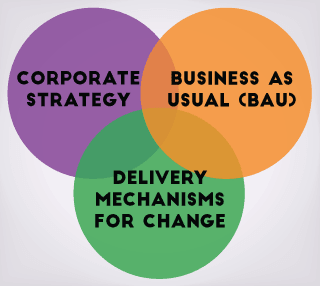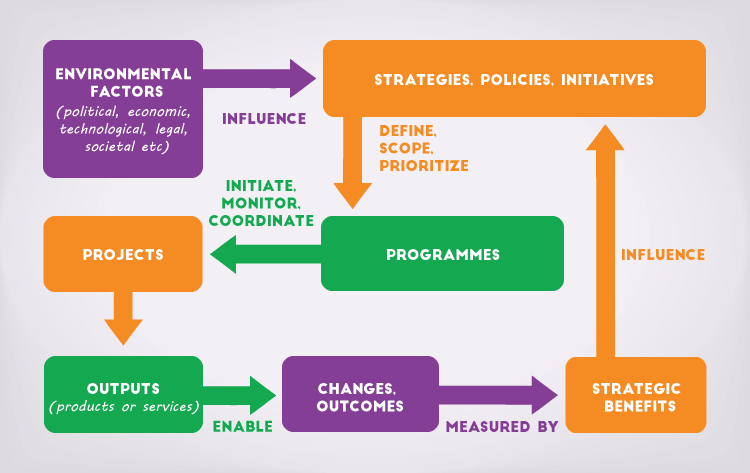The pressures to adapt are coming from many angles: technological innovation, increased regulation, takeovers and acquisitions in the private sector, and delivery of policy driven from changing political parties in the public sector.
Those organizations which can learn to transform themselves are more likely to survive. Programme management is increasingly being seen as a key tool to enable organizations to manage those transformations.
This article will explore what is a programme and what is programme management. It will then look at the success factors which are critical for programme management success. It will look at the programme management environment and will also look at Managing Successful Programmes (MSP®) - the UK’s most popular programme management framework.
Finally, we’ll look at the programme management certification options and in particular the MSP training options which are available in the UK.
What is a programme?
A programme is a temporary organization set up to coordinate and direct a set of related projects. Projects are also temporary but usually for shorter durations than programmes. Projects deliver outputs – or products. Programmes deliver outcomes. A project may or may not be part of a programme.
What is programme management?
Programme management and project management are complimentary approaches. Within a programme, projects are initiated, executed and closed. The programme will coordinated the different projects. However, programme management does not remove the need for effective project management.
Programme management refers to the coordination, direction and implementation of a set of related projects and transformation activities to achieve outcomes and realize benefits which are of strategic importance to the organization.
 Programme management aligns 3 critical business areas: corporate strategy, delivery mechanisms for change and the ongoing business as usual (BAU).
Programme management aligns 3 critical business areas: corporate strategy, delivery mechanisms for change and the ongoing business as usual (BAU).
There will inevitably be a tension between these 3 elements and programme management needs to manage these tensions in order to deliver the transformational change that will meet the organization’s needs.
The programme’s projects will deliver the products and solutions which will enable the business changes to come about and programme management manages the transition of these products into the business as usual environment. This is done by organizing things into more manageable chunks (tranches) with review points for monitoring progress, assessing performance and benefits realization.
Typically in an organization there will be competing demands for resources and programme management must provide a framework to enable the resources to be utilized effectively across the projects within the programme.
Programmes often involve changes to the culture and style of an organization and therefore programmes need to recognize the human factors involved in such transformations.
Programme management success factors
With competing demands for resources between the programme’s projects and the operational side of the business (BAU), and with potentially complex inter-dependencies and competing priorities to resolve, there will be many risks inherent within any programme.
The change promised by a programme is unlikely to be delivered without the following in place:
- Board/executive level support
- Strong leadership
- Realistic expectations of the organization’s capacity and ability to change
- Strong focus on benefits
- Blueprint of the future capability
- Well-defined and well-communicated vision
- Ongoing engagement of stakeholders
To assist the organization in leading and managing programmes it makes sense for the organization to adopt a well-established programme management framework to assist in achieving the above.
The programme management environment
Organizations are shaped and influenced by a myriad of external and internal factors. Take climate change as an example. International agreements about CO2 emissions influence government policy and strategies. Programmes are then defined, scoped and prioritized to implement the desired outcomes. Each programme will entail several projects that will create new products or services. These might be government legislation covering the use of fossil fuels, the phasing out of coal-powered power stations, the introduction of higher standards for emissions from motor vehicles, the setting of targets for emissions and the implementation of flood defences within the country.
Within each programme, the projects will require coordination and direction. The outputs of the projects will need to be transitioned into operational use and these will enable the changes and outcomes to come about (e.g. lower CO2 emissions). The strategic benefits can be measured after these outcomes have been achieved. For example, a reduction in future costs to compensate people and businesses for flood damage. The realization of these benefits in turn, will likely become one of the factors which influence further strategies and initiatives.

Managing Successful Programmes (MSP)
In the UK, the most well-known programme management approach is known as Managing Successful Programmes (MSP). Managing Successful Programmes was first created within the UK Government in 1999 and has been used successfully ever since, both within the public and private sectors. It gained much prominence when it was used to successfully direct and coordinate the London 2012 Olympic programme.
MSP is particularly well-suited to programmes which involve political and societal change. For example, a programme to provide free pre-school education to children is likely to have low predictability in terms of its outcome. The benefits of such a programme might be that these people will make a more meaningful contribution to society after they turn adults. However, this is a long time into the future, and such outcomes are risky and hard to predict.
MSP is also suitable for programmes which focus on business transformation, for example moving into new markets or implementing new service partnerships. There will be uncertainty about how some parts of the organization might react. Also, the greater the impact on customers and markets, the greater the risk. MSP is designed for such programmes.
There are also programmes which are more specification-led. For example large-scale engineering programme such as a city’s Olympic programme for the construction of stadiums and related infrastructure. These programmes are led by the specifications of the outputs. Often on such programmes there is relatively little ambiguity about what the programme will deliver. However, this doesn’t mean such programmes will be risk-free. They are often both risky and complex. On such programmes, MSP can still be used but may need to be scaled down.
When to use MSP?
MSP has been designed to accommodate high levels of complexity, ambiguity and risk. MSP is therefore highly suitable as a programme management framework for transformational change.
If an organization is simply delivering something new into its existing business as usual operational environment (e.g. developing a new product to bring to market) then a programme management approach is not required. Instead a project management approach will suffice. If an organization simply want to efficiently allocate resources to its different projects and to coordinate them, then a programme management framework such as MSP is also not required.
MSP training
The demand for professionals with programme management skills and qualifications is growing. As more and more organizations utilize programme management frameworks to enable them to accomplish transformational changes, this demand will continue to grow.
If you are looking to move into a programme management role, or are currently working in such a role, then training in programme management principles and best practices is vital to equip you with the skills and knowledge to help you to become effective in your role. That’s why I would recommend you consider gaining MSP certification.
MSP certification comes in 2 flavours. There’s the MSP Foundation certification and the higher level MSP Practitioner certification. Both are available by attending classroom training. MSP Foundation is a 3 day course, whilst gaining the Practitioner level qualification is usually done by combining both Foundation and Practitioner together in a 5 day course.
Conclusion
Programme management is increasingly being used to help organizations transform the ways they do business. Programmes are the lifeblood for organizations in today’s competitive world.
Professionals with an understanding of programme management frameworks such as MSP can boost their career by gaining certification in MSP. In the UK especially, MSP is the preferred programme management certification.
If you’re currently a project management professional, then I’d suggest that moving into a programme management role is a natural career progression. With relatively few people already certified in MSP, having an MSP certification on your CV can certainly differentiate you from many of your competitors in the jobs market. What’s not to like about that?